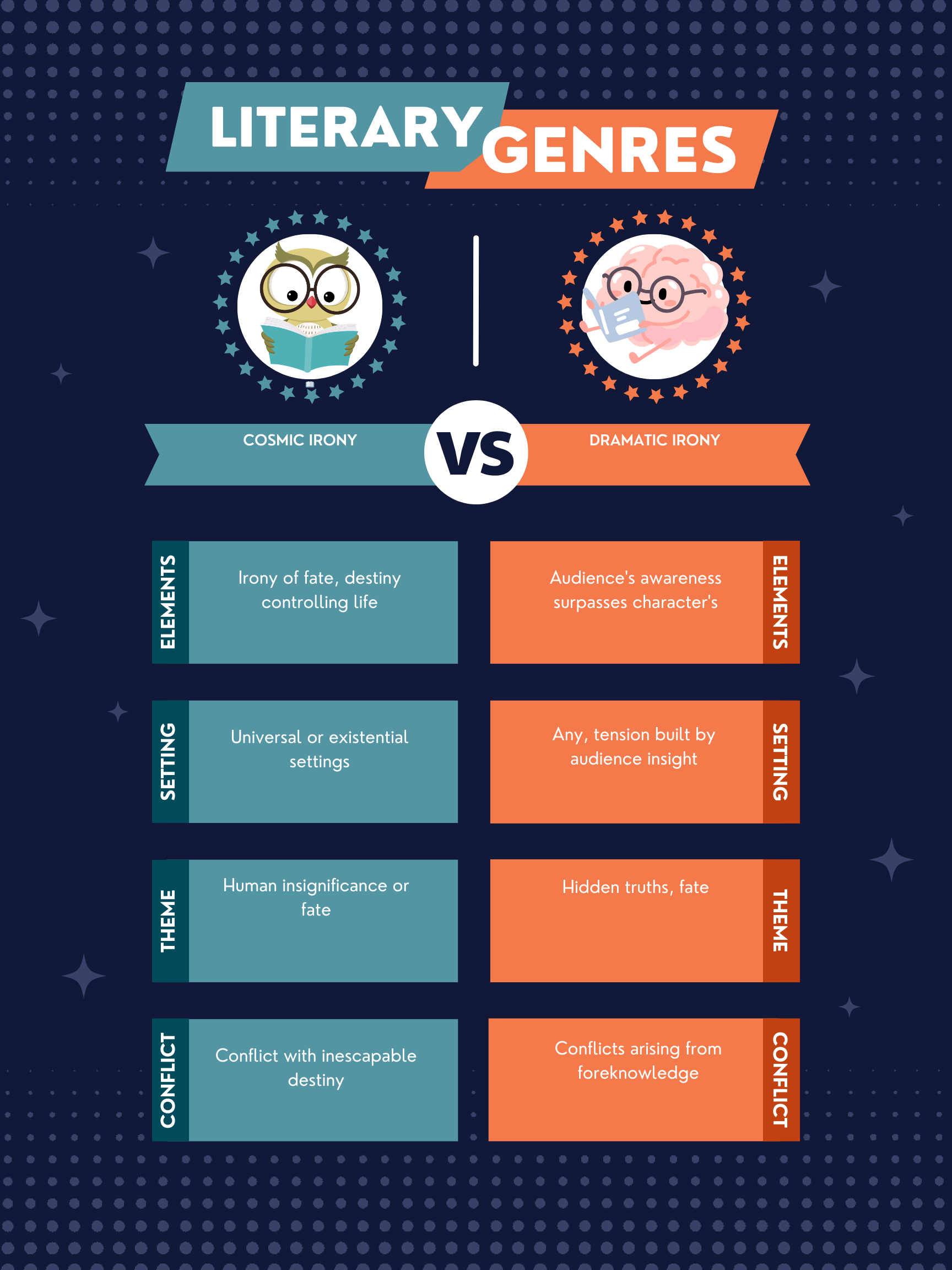Cosmic Irony suggests that fate or destiny controls human hopes and endeavors with ironic or cruel outcomes; Dramatic Irony occurs when the audience knows something the characters do not.
Cosmic Irony
Cosmic Irony, also known as Irony of Fate, operates under the notion that the universe is indifferent to human desires and can ironically thwart human intentions. This device suggests a misalignment between human aspirations and the universe’s grand scheme, often leading to unexpected and cruel outcomes.
Example: In Thomas Hardy’s Tess of the D’Urbervilles, Tess’s constant struggle against societal and cosmic forces highlights cosmic irony. Despite her efforts to lead a virtuous life, fate conspires against her, leading to tragic outcomes.
Dramatic Irony
Dramatic Irony is a storytelling technique where the audience possesses knowledge that the characters do not. This gap in awareness often leads to tension, humor, or profound sadness, as viewers anticipate the characters’ reactions when they uncover the truth.
Example: In Shakespeare’s Romeo and Juliet, the audience knows that Juliet is alive, pretending to be dead. However, Romeo, unaware of this truth, believes she has died and kills himself. Juliet’s subsequent awakening and reaction to Romeo’s death is a classic example of dramatic irony.
Summary
| Literary Device | Definition | Purpose | Usage | Relevant Examples |
|---|---|---|---|---|
| Cosmic Irony | The belief that the universe is indifferent to human desires, leading to ironic outcomes. | To highlight the unpredictability of life and the futility of human efforts against fate. | Often found in tragedies or stories with a fatalistic tone. | Thomas Hardy’s Tess of the D’Urbervilles. |
| Dramatic Irony | When the audience knows something that the characters do not. | To create suspense, humor, or sympathy. | Used in dramas, comedies, and tragedies to enhance emotional engagement. | Shakespeare’s Romeo and Juliet. |
Writing Tips
For writers keen on incorporating Cosmic or Dramatic Irony into their work, here are some tips:
- For Cosmic Irony: Focus on the broader universe and its indifference to the protagonist’s desires. Craft narratives where the character’s efforts are juxtaposed against an uncaring or hostile fate. Example: Create a character who works tirelessly to prevent a disaster they foresee, only to realize their actions inadvertently cause the event they aimed to prevent.
- For Dramatic Irony: Develop scenes where the audience has key information that the characters are oblivious to. This can be achieved through a narrator, a scene showing pivotal information, or through the dialogue of other characters. Example: In a mystery novel, let the audience know the identity of the antagonist early on, while the protagonist remains in the dark, building tension with each near discovery.
FAQs
What is the main difference between Cosmic Irony and Dramatic Irony?
Cosmic Irony involves the universe’s indifference to human endeavors, leading to ironic outcomes, whereas Dramatic Irony involves a discrepancy between what the audience knows and what characters are aware of, creating tension or humor.
Can both Cosmic and Dramatic Irony be used in the same story?
Yes, both forms of irony can coexist within a narrative, each enriching the story in unique ways by adding layers of complexity and emotional depth.
How can understanding these literary devices improve my writing?
By integrating these devices, you can enhance narrative tension, deepen thematic elements, and create a more engaging and thought-provoking story for your readers.
Exercise
Identify whether each sentence or scenario involves Cosmic Irony or Dramatic Irony:
- A protagonist spends their life searching for a treasure that, unbeknownst to them, was always buried in their backyard.
- The audience knows the hero’s trusted advisor is the villain plotting their downfall, but the hero believes this advisor is their most loyal supporter.
Answers:
- Cosmic Irony.
- Dramatic Irony.
Other Device Comparisons You May Find Interesting
- Metaphor vs. Simile: Delve into the nuanced differences between these two figurative language devices.
- Alliteration vs. Assonance: Explore the distinct ways these devices play with sound in literature.
- Foreshadowing vs. Flashback: Understand how these techniques manipulate time to enrich storytelling.
- Allegory vs. Symbolism: Discover the varying depths at which these devices imbue narratives with meaning.
This guide offers a lively journey through the realms of
Cosmic and Dramatic Irony, equipped with examples and tips to inspire both readers and writers alike! 🌌🎭

